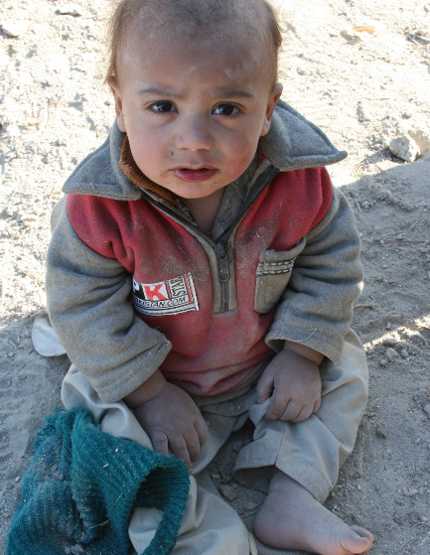
Displaced children are vulnerable to malnourishment, experts say. (Photo: Akmal Dawi/IRIN )
Hundreds of families allegedly forced out of their homes in Kapisa Province, northeastern Afghanistan, by clashes between Taliban insurgents and pro-government Afghan and foreign forces have sought refuge in the eastern outskirts of Kabul.
“There is always fighting, bombing and insecurity in Nejrab and Alasaay,” said one displaced man referring to the two Kapisa districts affected. He said he had lost his 15-year-old son in the fighting.
“Some families have fled because of ethnic and tribal hostilities,” Haji Zekria Zakir, a representative of the displaced families, told IRIN.
A newly built private market in the Nassadji Bagrami area of Kabul is now home to the internally displaced persons (IDPs) who first began settling there in November 2009.
The Ministry of Refugees and Returnees (MoRR) had estimated their number at about 180 families in December, but the IDPs themselves say there are now over 1,200 families (70,000 individuals).
Most IDPs said they had received no assistance from the government or aid agencies, and faced food, health, water and cold-related problems.
“The shops have no window panes and are extremely cold, particularly at night,” said Gulab Jan, an elderly man.
“We need tents because they are warmer than the shops,” said IDP representative Zakir.
Because there is no water point in the market, people said their children were having to get water from nearby houses.
Malnutrition
A mid-upper arm circumference (MUAC) assessment conducted by Action contre La Faim (ACF) along with two other NGOs on 148 under-five children in the settlement, found malnutrition was a serious problem.
“Among the children screened… six were severely malnourished, 32 were moderately malnourished and 41 were at risk of malnutrition,” Shashwat Saraf, head of the ACF mission, told IRIN.
Five of the severely malnourished children have been referred to Kabul’s Maiwand Hospital for treatment but parents of the remaining child refused to allow their child to be taken to hospital.
Hospital staff were reluctant to accept the children at first: “The reason mentioned was the children were dirty and that the hospital did not have any hygiene kits,” an ACF report said, but they were eventually admitted after NGOs pressed for their treatment.
ACF and other NGOs have called for “supplementary feeding assistance to children aged 6-59 months and to pregnant and lactating women”.
Hundreds of displaced families live in 17 locations in and around Kabul city, according to MoRR.
“Displacement affects the food security situation of people and reduces their coping capacity, thus making them - particularly the children - vulnerable to malnourishment and disease,” said ACF’s Saraf, who suggested nutrition monitoring should be conducted for other IDP groups across the country.
The UN Refugee Agency (UNHCR) estimates there are about 275,000 IDPs in Afghanistan, but MoRR says there are over 400,000. Some IDPs are in settlements inaccessible to aid agencies due to insecurity.



